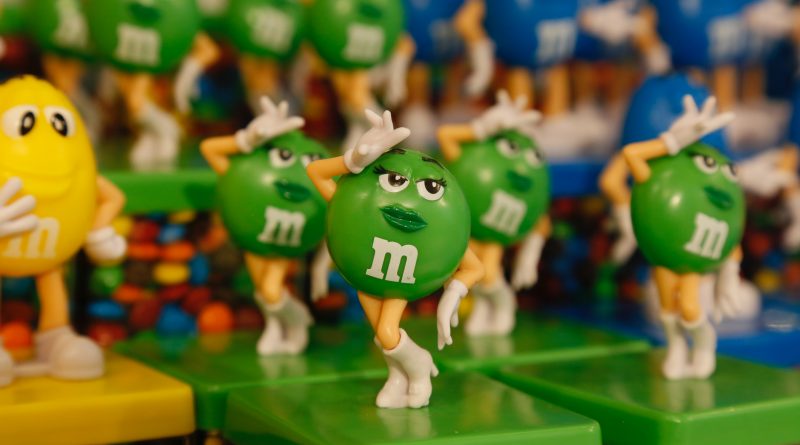Mars Wrigley’s ‘Progressive’ Rebranding of M&Ms is Misguided Feminism
Shweta Parthasarathy
Digital Editor
Earlier this year, Mars Wrigley announced that it will be updating its personified M&M characters to be more “current” and “representative of [M&M’s] consumers,” according to the president of Mars Wrigley North America, Anton Vincent, in a report for CNN. The two female M&Ms will be different; the Green character will wear sneakers instead of high heels, and the Brown character will wear more ‘sensible’ heels rather than stilettos. The M&M characters’ upgrade is intended to reflect Mars Wrigley’s commitment to “upend the expected [and] break through barriers” using its products, as the M&M website notes.
Mars Wrigley’s move came just days before Disney unveiled a new pantsuit for Minnie Mouse in honor of Disneyland Paris’s 30th Anniversary and International Women’s Day, according to the park’s website. CNN reports that Stella McCartney, who designed the navy blue polka-dotted suit, explained that her creation would serve as “a symbol of progress and empowerment for a new generation.”
The decisions made by Mars and Disney are said to be reflective of their customers’ dedication to feminism and inclusivity, but the changes have become a point of contention amongst both conservatives and liberals.
In a Fox News interview, conservative commentator Candace Owens criticized Disney for destroying “fabrics of our society” by making Minnie “more masculine,” while other conservative hosts made similar hyperbolized arguments against the update to M&M’s characters, including Greg Gutfeld on his Fox broadcast show Gutfield!, and Tucker Carlson, according to The Week. Carlson derisively and erroneously condensed Mars’s goal: “M&M’s will not be satisfied until every last cartoon character is deeply unappealing and totally androgynous. … When you’re totally turned off, we’ve achieved equity.”
Conservatives have argued that these changes are neither progressive nor simply unnecessary; rather, they pose a grave danger to the understanding of gender that has shaped American society.
Those who support Mars Wrigley and Disney’s decisions, however, believe that the changes are a step towards eroding gender norms. The Associated Press explained that the overhaul of the M&Ms was meant to make them less “stereotypically feminine.” This was also the motivation behind changing perceptions of the Green M&M, which was often sexy and seductive, whose sultry tone in one advertisement literally melted the male M&Ms.
However, that reasoning is exactly what many progressives disapprove of. The changes made to the Green M&M, in particular, have been criticized for undermining a basic principle of feminism: the right to decide what kind of woman you are, without judgement. Wearing stilettos or heels makes one no less of a woman and in no way undermines society’s progress towards gender equality. According to The Independent, one social media user pointed out, “Isn’t the point of feminism that we get to choose if we want to be feminine or whatever we want[?]”
Choosing one version of female in favor of another automatically marks the replacement as superior. Switching from the ‘sexy’ image of the Green M&M to a more modest and supposedly progressive one demonizes female sexuality and sends the message that women, or female anthropomorphized candies, should not express their sexuality, or they risk losing respect, power, and credibility. Pitting one group of more modest ‘sensible’ women against another more adventurous, risqué group of women achieves something entirely opposed to Mars Wrigley’s stated goal of empowering all women.
Admittedly, Mars and Disney are not alone in attempting to shift perceptions of their brands—many companies have adapted to meet society’s evolution in recent years. Mattel launched a new line of Barbies in 2015 with a range of skin tones, hair types, and body types, reports NPR. More recently, according to the New York Times, Hasbro announced last year that it would be dropping ‘Mr.’ from its Potato Head line of products in order to promote gender inclusivity.
What sets Mars Wrigley’s modifications apart, however, even from Disney’s changes, is their demonization of a certain type of female representation in favor of what they consider to be more progressive. Unlike the new M&Ms, Minnie’s new outfit is an addition to her existing wardrobe, actively including all women regardless of their clothing. Barbie’s revision actively included women with all skin, hair, and body types, and the Potato Head adaption actively included all gender identities. In contrast, the M&Ms’ rebranding actively excludes certain women whom Mars deemed to be antithetical to progress.
However well-intentioned Mars Wrigley’s M&M makeover may have been, the fact remains that the move was fundamentally inimical to their stated goal of creating a platform for inclusivity. The unintended consequence of what the company likely believed to be an empowering move was a betrayal of one of the cornerstones of feminism: the right to choose, free of judgement, the woman you want to be.




